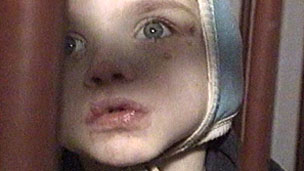After Romania's dictator
Nicolae Ceausescu was overthrown in 1989, the world learned of the
shocking conditions in which many children lived in the country's
orphanages. More than 20 years later, those children are adults - and
for some of them at least, life is far, far better than it was.
To arrive in Siret is to arrive at world's end.
The train from Bucharest - clatter-boom, clatter-boom, through the night - goes only as far as Suceava. An historic city mauled by the communists.
Immediately after the revolution of 1989 I travelled from here to Siret in an elusive taxi.
Now Catalin - with his own car hire firm and a canary yellow cap - waits for me at the station, ostentatiously dusting down his Vauxhall Astra.
The drive, hurtling between cabbages and corn, horses with their carts and a pink sky that crashes into the Moldavian plains, is a reminder of how far you have come from the dusty fug of Bucharest's Gara de Nord.
Siret was a quiet border town, spitting distance from the vast expanse of the USSR.
Change came abruptly in 1990, when its secret was exposed on
an international stage. In a four-storey former Austrian army barracks,
Romania hid its largest gulag for abandoned and disabled children, far
away from the capital. Communists did not cope well with imperfection.
In came the foreign do-gooders. The broken orphans learned to cry and Siret's entrepreneurs sourced German beer for their prestigious newcomers.
Some charities lasted the course - others moved on with the rolling tide of news but amidst the global opprobrium Siret and many of its abandoned young stayed put.
They are adults now. Few were adopted - it turns out Westerners do not cope well with imperfection either.
Eventually the barracks was abandoned.
The 100-plus adults unable to live independently were moved to another austere stone building - smaller this time with wire-nettings and landings overlooking a concrete court yard.
Dribs and drabs of foreign money have paid for new sheltered accommodation for the lucky few.
But more than 20 years after the revolution
the most vulnerable adults still rock back and forth in a building that
resembles a human hen coop.
When they saw us the young adults ran over, euphoric,
anticipating attention, touching the camera, hugging me and the other
visitors, keen for a small shard of love. A reminder of what it used to be like when the foreigners came to play.
Two decades on and the familiar smell of sweat and wet stone walls has not gone away, nor the disturbing noises of those unable to express themselves.
But there is a key difference between now and then.
He is called Tibi Rotaru - a man with his clear kind blue eyes and a crumpled shirt. He was there to meet me.
A local lad of just 17 when the first wave of foreigners came, Tibi was roped in as a translator.
The volunteers had found their first and most-important ally.
He went on to Bucharest then Germany and Holland to study psychology, before eventually moving back to Siret and taking over responsibility for the orphans.
It is this unassuming man who has turned a small community once scarred by a legacy of child abuse into an oasis of tolerance.
The young adults now wander freely about the town, they sweep the church steps, cadge cigarettes and laugh with the locals.
You can spot the ones from the hospital, they are smaller than everyone else, even the able-bodied are hunched - despite their tender years they have haggard faces and their stumbling gait gives away the horror story that was their childhood.
Tibi shakes his head. "Their lives were stolen from them, and still they don't have what they need," he says.
-------------------------------------------------------------------------------------------------------------
"When I first walked into the large grey building at the heart of Siret, my immediate instinct was to walk straight back out again.
"Half-naked children leapt from every direction, clawing at my clothes, and there was an overpowering smell of urine and sweat that made me want to retch."
------------------------------------------------------------------------------------------------------------
His young adults, and make no mistake they are
his - to watch him with them is to watch a father with an unruly loving
brood - now have a bright shiny new home to move into.
The undignified rows of beds will at last be history. "Of course," Tibi reminds us, "this building has been ready for over a year, sitting empty".
He knowingly points to the crow's feet in the corners of his eyes.
"I have travelled fortnightly to Bucharest in the hope of meeting a minister.
"A lot of funds have been spent on this project, but they couldn't find the money for a boiler."
He laughs: "How can I move the young people with no heating?"
But Tibi has the patience of a man born into a system he knows he must work with, not against.
Siret's young adults have now been told their new house will finally have heating and hot water.
In a town where the winter temperature drops -30C (-22F) Tibi has once again proved that dreams can come true - so long as you are prepared to wait 23 years.




